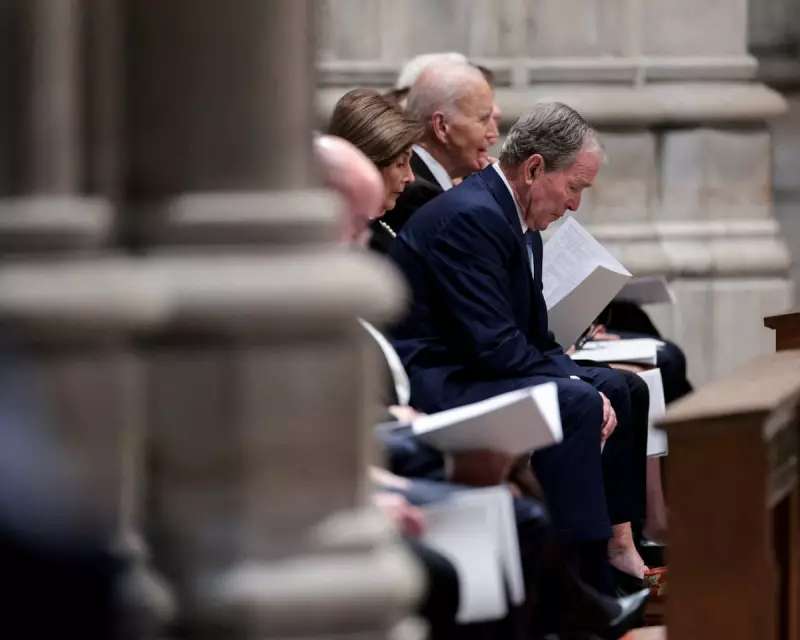
A Gathering of Washington's Political Elite
The Washington National Cathedral hosted a solemn ceremony for Dick Cheney, the 46th US vice-president who died earlier this month aged 84. The funeral brought together former presidents and vice-presidents from both Democratic and Republican parties, creating a rare moment of bipartisan unity in the capital.
More than a thousand guests witnessed eight military body bearers carefully place Cheney's flag-draped casket on a catafalque, an emotional moment described as being as gentle as lowering a baby into a crib. The two-hour service featured plangent music, solemn processions and tearful eulogies beneath the cathedral's stained glass windows and soaring vaulted ceiling.
Notable Absences and Political Symbolism
The ceremony represented a throwback to a less divisive political era, with prominent figures from across the political spectrum in attendance. Bill Kristol, Chris Wallace, James Carville, Anthony Fauci and Rachel Maddow were among the notable guests seen mingling in the historic cathedral.
Significantly, Donald Trump and his vice-presidential candidate JD Vance were not invited to the ceremony, despite Trump having spent the same day making inflammatory statements about political opponents. Their exclusion highlighted the deep divisions within the Republican Party that Cheney himself had come to represent in his later years.
Cheney's Complex Legacy
The funeral service presented Cheney as a patriotic public servant, with eulogies describing him as "a still point in the turning wheel" according to his longtime cardiologist Jonathan Reiner. Former NBC News correspondent Pete Williams recalled "a good and decent man", while family members portrayed him as a devoted grandfather who loved John Wayne films and the American west.
Former president George W Bush, wearing a blue tie with his receding hairline visible, eulogised Cheney as "solid and rare and reliable", praising a man whose "talent and his restraint" exceeded his ego. Bush made only the most tangential reference to Cheney's involvement in one of America's darkest chapters, focusing instead on his dedication to protecting the United States.
The Iraq War's Conspicuous Absence
Despite the extensive praise for Cheney's public service, the ceremony notably omitted any meaningful acknowledgement of his most controversial legacy: the Iraq War. Cheney's baseless advocacy for the 2003 invasion, including his firm assertion that "there is no doubt that Saddam Hussein now has weapons of mass destruction", represented a breaking point in public trust that many analysts argue paved the way for Trump's rise as an anti-establishment candidate.
As vice-president, Cheney championed sweeping surveillance powers under the Patriot Act and defended controversial "enhanced interrogation" techniques, creating a playbook that Trump would later use to justify cracking down on civil liberties. The hundreds of thousands of people killed in the Iraq war and its aftermath received no mention during the cathedral service.
A Family's Political Journey
Liz Cheney, who was ousted from the congressional Republican party over her opposition to Trump, delivered a subtle eulogy that acknowledged her father's later political evolution. She noted that John F Kennedy, a Democrat, had inspired her father to enter public service, and emphasised that "bonds of party must always yield to the single bond we share as Americans".
Her words reflected how Cheney had emerged as a critic of his own party's populist drift in his final years, having called Trump a "threat to our republic" and even endorsing Kamala Harris in last year's presidential election. This transformation mirrored Darth Vader's redemption arc that some observers found fitting, given Cheney's longstanding "Darth Vader" nickname within political circles.
The Paradox of American Power
The ceremony highlighted the central paradox of Cheney's career and, by extension, decades of US foreign policy: defending democracy at home while undermining democratic aspirations overseas. Author Jeremy Varon, who wrote "Our Grief Is Not a Cry for War: The Movement to Stop the War on Terror", suggests this double standard stems from an "us versus them" mentality that prioritises American security above all else.
As the Washington elite, overwhelmingly white, paid their respects to Cheney, the ceremony became what observers described as "an exercise in omission" - a selective remembrance that reflected what a nation chooses to see when it looks in the mirror, and the uncomfortable truths that remain unspoken in polite political company.
The funeral ultimately served as a requiem not just for Dick Cheney, but for a certain vision of the Republican Party that has been fundamentally transformed by the very forces his policies helped unleash upon the American political landscape.






